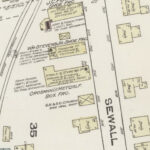Election season is upon us here in Marblehead — evidenced at the very least by the sheer amount of ink spilled in this very paper about the candidates and the races before voters on Tuesday.
While the whole town holds its breath to learn the outcome of the contested races for Select Board and School Committee and the fate of the proposed $2.47 million override that would plug the structural deficit in the town’s budget, in this space we’re going to examine the election of 35 years ago, held not in June, but in May.
Then, residents were similarly faced with a choice between six candidates for five Select Board seats (then the Board of Selectmen), looking at a ballot that featured a number of incumbents and a challenger who once served on the board. (History does repeat itself, doesn’t it?)
And, in what could be a fascinating bit of foreshadowing, in 1988, The Daily Evening Item noted that Thomas A. McNulty, a former selectmen, made a “roaring comeback” to claim the most votes of any candidate on the ballot. It’s a scenario that could play out once again next week as Bret Murray once again seeks a spot on the board after losing reelection.
McNulty earned 2,476 votes, easily topping the rest of the field in the selectmen race, with incumbent Arnold Alexander the next highest vote-getter at 2,043. Town Moderator Stephen Howe, who ran unopposed, was the only other candidate to clear 2,400 votes, finishing with 2,432.
The election results that year opened the door for McNulty to return to the chairmanship of the board.
“I’m very pleased and appreciative of the support accorded me by the voters, who seem to feel that I’m the person they want to represent them on the board,” McNulty is quoted as saying.
McNulty was nearly reelected to the board during the previous year’s elections, despite not running, with a sticker campaign falling “just short” after picking up steam as the election drew nearer.
He expected the next few months to be rocky and encouraged residents to learn about the Proposition 2 1/2 override process.
Down the ballot, William Woodfin II topped the three-man race for the Planning Board, earning 2,001 votes to outpace incumbent James Bishop and David Slepian. Bishop was the second highest vote-getter, at 1,943, and he and Woodfin were set to serve three-year terms.
The Cemetery Commission race was no contest — at least according to voters, who handed Jean Eldridge a resounding victory over Charles Hall, 2,077 to 609.
The remaining contested races before voters were for the Board of Library Trustees, the Recreation and Parks Commission, and the Water and Sewer Commission.
On the library board, Marianne Barnicle, an incumbent, and Stephen Decatur emerged as the top vote-getters, with Barnicle leading the way with 2,243 votes. J. Donald Doehner received 545 votes.
All five incumbents were reelected to the Recreation and Parks Commission, with challenger Rose Ann Wheeler well behind the rest of the pack at 1,151 votes. Robert Jackson was the lead vote-getter in that race, followed by Susan Finigan Stanchfield, Philip Norcross Jr., Gerald Clay, and Raymond Katzen.
And, in the last contested race, incumbent Emerson Brown led the field with 2,256 votes, earning reelection to the Water and Sewer Commission. Candidate Frank Legro Jr. was the second-highest vote-getter, topping F. Carlton Siegel by a margin of more than 300 votes.
In the uncontested races, Richard Riess won a term on the Board of Assessors, Carl Goodman was elected to the Board of Health, Jacqueline Williams won a seat on the Housing Authority, Erwin Rhode was elected to the Municipal Light Commision, Pauline Howes won a term on the School Committee, and William McLaughlin was elected as surveyor of highways. Each of those candidates, aside from Riess ,were incumbents.


